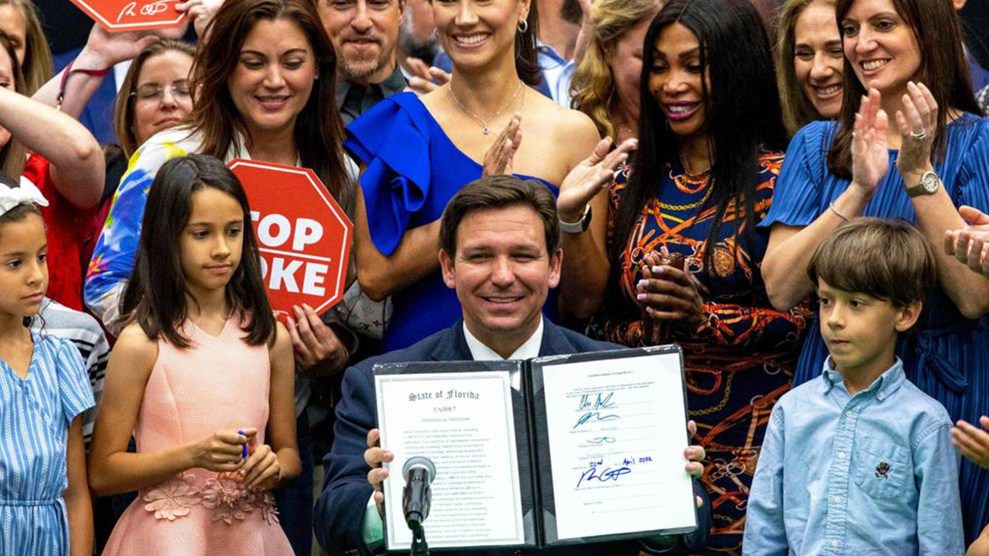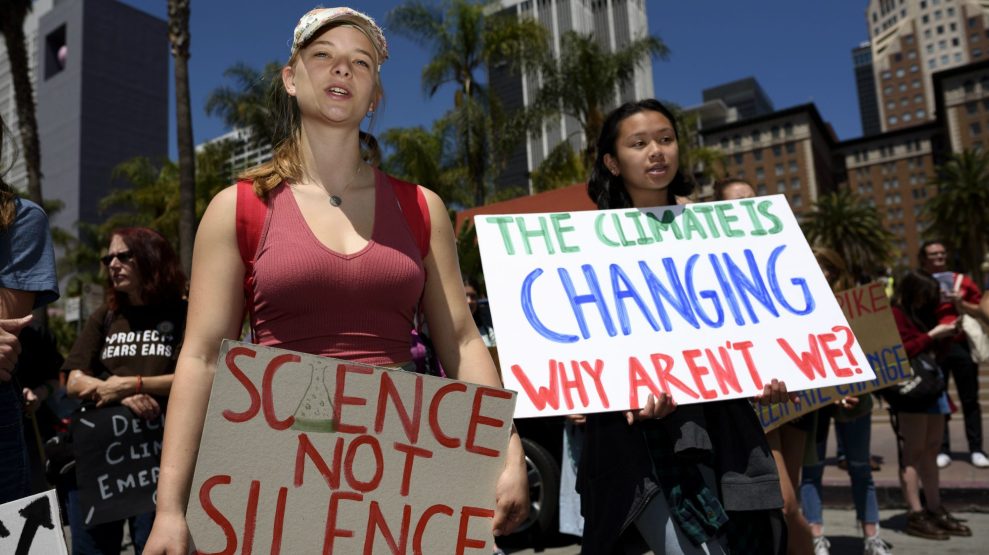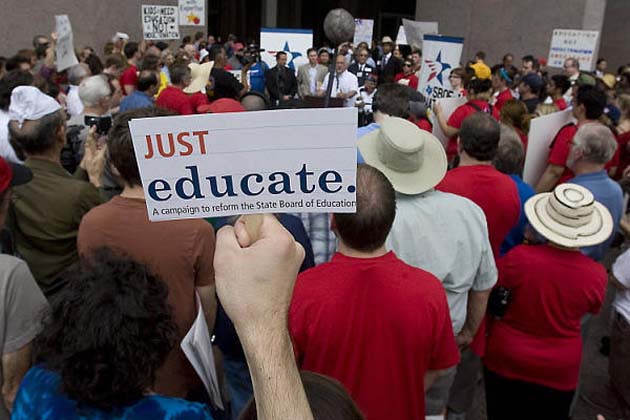
A girl works on an Earth Day project.Davide Zanin/Getty
This story was originally published by Grist and is reproduced here as part of the Climate Desk collaboration.
Carolyn McGrath thought she was ready for her testimony in front of the New Jersey Department of Education. An art teacher, she had dressed in a jaunty polka-dot blouse and chunky green necklace, and had a written statement prepared in favor of teaching climate change in every school subject.
She hadn’t expected any controversy. But by the time it was her turn to walk to the podium last month, she was so nervous she visibly shook. “It was such an uncomfortable situation,” she said later. “I don’t like confrontation.”
McGrath is passionate about teaching climate change; she’s given her students assignments like creating portraits of climate activists. So she was delighted this past fall, when the state of New Jersey joined the global vanguard in climate education. New Jersey is the first state in America to adopt standards for learning about climate change in each grade, from K through 12, and across several different subjects, even physical education.
Initially these additions didn’t draw much political heat, possibly because sex education standards were being updated at the same time. But this year, the standards in the core subjects of math and English language arts came up for revision. Proposed draft revisions also include climate change. This is important, advocates say, because these are the core subjects that students are tested on, and for which schools and districts are held accountable.
And this time was different. At the May 3 public hearing, in front of two members of the State Board of Education, supporters of the changes, including McGrath, were blindsided and well outnumbered by organized right-wing activists who testified against teaching climate change.
It’s one meeting, but it could be a bellwether. Since the COVID-19 pandemic, school boards have become ground zero for the culture wars, as they have been at times throughout American history. Right-wing activists tapped into discontent over school closures, growing awareness of LGTBQ+ rights, and the backlash to the Black Lives Matter movement. The resulting brouhaha has buoyed many political fortunes, notably that of Republican presidential candidate and Florida Governor Ron DeSantis. Now this same political machine may be turning its focus to climate education, just as the movement to teach it is getting off the ground.
The anti-climate-change voices at this meeting were clearly veterans of the culture wars. Several who spoke at the meeting identified themselves as part of Team Protect Your Children, or Team PYC. This New Jersey-based group has spent years organizing against “the unsuitable normalization and glorification of abortion and the homosexual lifestyle” in public schools, in the words of one woman who spoke.
“Climate change is based on weak science,” said a Team PYC member named Kathleen Kirk, citing a roster of discredited scientists and a climate-denying documentary available on YouTube. “This global warming theory is very scary for little children.”
“Encouraging activism is not why we send our children to school,” said another, Dawn Flynn, from Morris County, New Jersey. “The topic of climate change has become very divisive. Politicians and even scientists are unable to agree on the causes and effects.”
“My concern is that the kids are not indoctrinated,” said Ray Bovino, who added, on a slightly different topic: “If teachers want to teach creationism instead of the theory of evolution, should they not have that freedom?”
John Tomicki of the League of American Families, a vocal activist for decades opposing abortion, same-sex marriage, and interracial marriage, spoke against the standards. Also registered to attend was Pnina Mintz, the chair of the Cherry Hill, New Jersey, GOP committee and part of a national group called No Left Turn in Education, which has been called “one of the largest groups targeting school boards” regarding critical race theory. (Mintz, Tomicki, and Team Protect Your Children did not respond to requests for comment.)
But their views do not represent most New Jersey residents. A May 15 poll from Fairleigh Dickinson University found 70 percent of the state’s residents favor requiring education about climate change in public schools. This figure included 96 percent of Democrats; Republicans were evenly split, with 45 percent in favor and 45 percent against.
In nationwide polls, too, large majorities say students should be learning about climate change in school. And there are signs of momentum. Currently, 20 states have adopted the Next Generation Science Standards, a voluntary project to improve the teaching of science created by states and a coalition of science organizations. These standards include climate change starting in middle school—but that doesn’t mean the topic is covered comprehensively. Connecticut followed New Jersey in requiring climate learning across grade levels, a law that takes effect next month. Oregon and California are considering similar bills.
There’s a growing awareness not only in the United States but around the world that climate literacy is about more than science and that it needs to be introduced early and often, as it is starting to be in New Jersey.
Lauren Madden, a professor of elementary science education at The College of New Jersey, also spoke in favor of expanding the standards at the May 3 meeting. Madden is currently studying the implementation of New Jersey’s new climate standards, and she’s led a professional development day to help teachers teach climate. She said it’s important to cover climate across subjects, because science alone doesn’t hold all the solutions.
“We’re going to need writers and artists and real estate agents and economists,” she said.
Climate lessons in kindergarten, she said, don’t have to be scary or complicated. They might build on familiar classroom activities like a weather chart, introducing the concept that climate is different from weather. That lays the groundwork for understanding in later grades how humans might be influencing the climate.
But the educators trying to advance the teaching of climate change are worried that organized political opposition, even from a minority, could still create a chilling effect. Madden’s forthcoming survey research finds teachers are saying they need more resources, training, and support to bring climate into the classroom. She also found, surveying dozens of New Jersey educators, that since the standards took effect, the percentage who said that some teachers might avoid the topic because it is “too controversial or politically sensitive” jumped, from nearly 10 percent to 17 percent.
“For me, [the standards] gave me this institutional support for what I was doing,” said McGrath, the art teacher. “I felt supported in what I was already teaching in my classes.”
LIke Madden, McGrath has seen that some of her colleagues need more training and support to actually incorporate the standards into their teaching. And if they instead get pushback from parents or community members, they may decide to leave the topic alone.
“People are looking to New Jersey across the country for an example,” she said. ”What are we doing to move this forward instead of moving it back?”












